THE WEST
If you're interested in the Western culture, I guarantee you that after checking out this page you’ll finally get to know the noble foundation of the Western culture, realise that life has a meaning, that there’s a powerful narrative which made the Western world so overwhelmingly successful in modern age, and that your life and decisions as an individual absolutely matter.
SOLUTION TO DECADENCE
Look around you at the state of the modern world. We have the most riches, the most powerful technologies, extensive infrastructure and countless possibilities of entertainment and personal fulfilment. And yet, overall dissatisfaction spreads like wildfire. Mental health issues are on the rise. Protests happen frequently in the name of real or apparent social problems that just never want to disappear. People don’t know what their true goals and values are. The line between reality and fiction, between objective sensory data and subjective perception becomes very blurry, indeed. What is going on?
My dear reader, if you’re confused, do not despair. You’re lucky that you found my essay in which I’ll enlighten your mind with facts, history, values, perspectives and inspiration. Let me start by confirming your unexpressed worry that the West might be in decline: yes, the West has been in decline for quite a few decades! That’s because we reached a phase of decadence, which is a period of time that all cultures eventually enter when they become saturated with their own views, influence, and institutions. That’s not anyone’s fault in particular. Deterioration always occurs in all civilizations throughout history when they become presumptuous, lazy and too comfortable in their ways of doing things. Then, the culture stops believing in itself.

People's overall dissatisfaction has spread in public life.
Have we become presumptuous, lazy and too comfortable? If your answer is no, then you haven’t looked at the world close enough. Yes, we are in such a phase of decadence. However, here’s some consolation: although we might be on a falling arc of history, that doesn’t mean that we’re on the final path of cultural demise that will eventually end our way of life. In fact, Rome has been sacked three times before it fell. Today’s Western world is not necessarily on that final downward spiral towards its end as Rome was in the 5th century AD. I claim that we’re on a smaller cycle of temporary decline, from which we shall re-bounce and believe in ourselves again. It’s up to us how long and painful this process needs to be.
The Western culture is in a temporary decline and disorientation when it comes to its core values. This crisis results not necessarily from any real events in the physical world, but primarily from the widespread lack of knowledge and mental misapprehension among westerners with regard to the history and philosophies of Europe and North America. The clear solution to the problem would be to gain knowledge so that topics and issues become much clearer in our minds. To see things clearly is to think clearly. And if we can think clearly, we can tackle the problems that our cultures face much better.
Let me explain to you in the following paragraphs why the Western culture at its core is truly good and how we can rise again from the bottom of disenchantment and nihilism to achieve new heights of cultural excellency and harmonious, human relations.
Are you ready for the bumpy ride? Let’s begin!
WHAT WESTERN VALUES ARE
The knowledge of what underpins the Western thinking and values is essential if we want to achieve collective meaningfulness with regard to our own culture, institutions and nations. That’s why the first step is to identify what Western values actually are. In a very generic sense the Western values are individuality, rationality, and self-sacrifice. Let’s take them one by one.
If you spin the concept of individuality further, you end up with the concept of liberalism which comes from the Latin word liberalis meaning freedom. Liberalism, or the concept of freedom, is the philosophy of individual rights, civil liberties, democracy and free enterprise. The concept of the freedom of the press derives directly from these liberties.
All nations which are truly democratic are based on liberalism. Liberal democracy is the default mode of functioning in any standard Western country (unless it was taken over by a delusional authoritarian regime). People take liberal democracies for granted. However, it took 2500 years for them to finally settle in the West. It will be the task of this text to show you how this unfolded historically.

Real justice is blind to ensure impartiality and absolute objectivity.
The second value of the West is rationality. The word comes from Latin rationalis or ratio which means reckoning, reason. Thus, rationality is the mind’s ability to reason, to conclude, to think. The words intellect, reason and mind denote rationality and will be used interchangeably in this essay.
Rationality, the ability to reason correctly, is what helped the West develop modern science and technology. People don’t seem to realise that the existence of today’s technology such as smartphones, cars, new materials, and basically everything electrical and electronic are due to the West’s predisposition towards strict thinking which gave rise to modern technology. Technology is a side effect that resulted from the emergence of modern science. Technology is applied science and both own their existence thanks to the West’s strict insistence on rational thinking in logic and mathematics. Of course nowadays science and technology have spread around the world. However, the initial impulse came from the West. I’ll show you how it all came about.
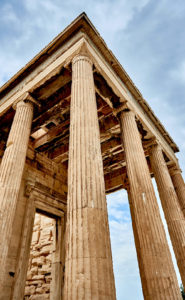

The values of individuality and rationality can be traced all the way back to their very source in the ancient Greek and Roman cultures. I will describe how it emerged there and how later it was picked up by the West to usher in a new period of liberal thought and democracy.
The third value of the West is the concept of self-sacrifice. You might wonder how I came up with this one, but if I bring up Christianity, you will immediately recognise what I mean. The central message of the Christian faith was the belief in the self-sacrifice of its key figure, the messiah, who sacrificed himself willingly for the good of humanity. It was a clear invitation for the Westerners to follow in the footsteps of that heroic figure and carry the cross of our personal sorrows and pains to help people around us. Although Christianity is no more that popular in Western Europe, its message of individuality and personal sacrifice remains strong in the US and other parts of the world.
Christianity was the main influence on society during the Middle Ages and the early modern period before the French Revolution. It doesn’t matter whether you’re a believer or not - we need to recognise that Christianity played a crucial role in most of the West’s history, a role that intertwined very tightly with Greco-Roman philosophies. You can’t understand the West by ignoring Christianity. Whether you like it or not, we will face Christianity in later paragraphs to understand its impact on the West.
There we have it - the values of the West in a nutshell. The aforementioned influences originated in ancient and mediaeval ages. However, the actual birth of the modern Western culture must be looked for much closer to our present time, beginning with the Renaissance at the close of the Middle Ages ca. 500 years ago.
ENLIGHTENMENT - THE FOUNDATION OF THE WEST
During the Middle Ages various kingdoms developed their rural economy. Cities grew and the collective mind evolved. At first, the intellectuals tried to rationally justify the Bible and its Christian creeds at the newly founded universities across Europe. With the growing demand for knowledge and through a unique tide of events ever more Greco-Roman manuscripts were discovered by mediaeval scholars. The newly discovered written knowledge was elaborated on and the research continued from there. Slowly, Europe’s culture once again became Greco-Roman.
The revival of antiquity ushered in the Renaissance which led the West out of the Middle Ages towards the conceptualisation of humanism as an ideal of a well educated person familiar with all domains of human life. Scholars and artists became very curious. Leonardo da Vinci was dissecting corpses to learn human anatomy in order to understand the beauty of the human body. The arts and sciences started to evolve, a process which culminated in the era of Enlightenment, a time period of over 150 years which was the direct originator of the modern Western world. Indeed, the West was founded upon the values of the Enlightenment which itself was based on the Greco-Roman rational philosophies.
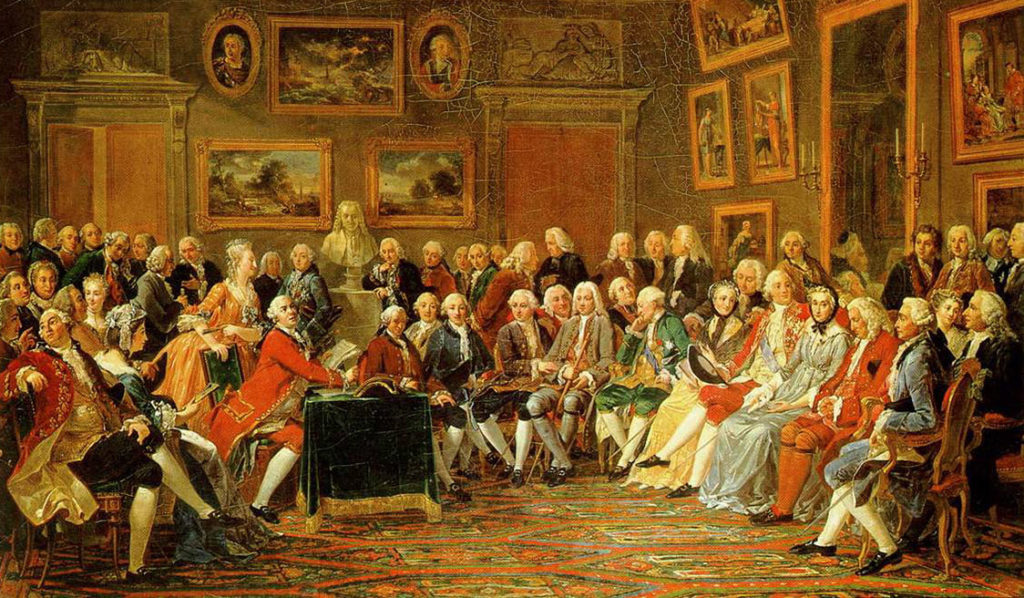
The Age of Enlightenment spanned the 18th century (1700s).
For a time Christianity and the ideas of the Enlightenment stood in direct opposition to each other. The present societies are the result of the ideas that were developed and promulgated by the philosophers of the Enlightenment in their constant interaction against Christianity. I will introduce you to the most important thinkers of that time later. However, bear in mind that it was a huge number of individuals in various European countries which carried that movement of rationality.
Enlightenment was the further improvement upon the Greco-Roman ideals and values. In combination with the Christian doctrine of individual salvation and self-sacrifice these two streams of thought make up the basis of the Western culture. We will explore the Enlightenment in more detail.
There you have it, dear friend - my summary of what constitutes the culture of the West. This was only a quick overview. To truly understand our core values we need to dive deeper into the ideas, movements and people of those periods. Now that we have a brief summary, let’s go chronologically period by period to discover how the spirit of the West emerged and evolved to the present day. Let’s begin in ancient Greece.
GREEK CULTURE
The philosophers of ancient Greece had a gigantic influence on the emergence of the Western spirit. Although there were many such thinkers, you can clearly find among those the few who became the main figureheads of world history.
Undoubtedly, we all should bow before Pythagoras, who defined the West as it would continue to become. Pythagoras is not just the man who formulated the Pythagoeran theorem that we all know from school. He was the founder of a whole system of thought, a philosophical, mystical and scientific movement that we call Pythagoreanism. If you think this was just an ancient school that became irrelevant thousands of years ago, you would be badly mistaken. Its influence continued to flourish in the many systems of thought in the following generations.
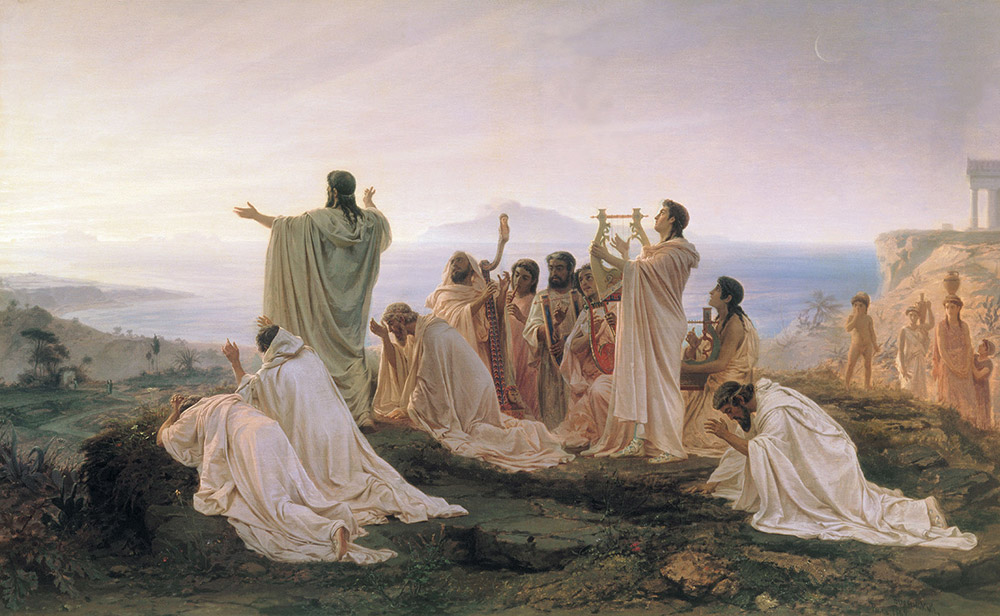
The Pythagoreans originated in 6th century BC.
Although the Western mode of thinking starts with Pythagoras, it’s important to focus on another great character when discussing the core of the Western values: Socrates. A part of the West is founded on the Socreatean method, which is the way of talking out topics in pursuit of knowledge without pretending to know anything. In fact, the most famous realisation by Socrates is the acknowledgment that one really doesn’t know anything worth knowing. From this perspective of intellectual honesty and curiosity real search for knowledge begins. In the spirit set by Socrates one should approach topics in discussions without hiding behind labels and superficial definitions.
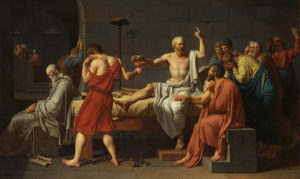
Socrates died by poison in 4th century BC.
Pythagoras and Socrates laid the foundation for Western culture. Plato was the next great thinker. In fact, you can put Socrates and Plato together as representing the same cultural spirit. Everything that we know of Socrates came through the philosophical writings of Plato. Additionally, Plato made it clear that the world is ruled by ideas and that ideas ultimately influence societies and the course of history. Plato promulgated ethical behaviour guided by virtues and ideals. His concepts provided material for all subsequent thinkers in the Western and Islamic world. Plato founded a school in Athens (academy) which influenced other movements at various points in history throughout antiquity, the Middle Ages and the modern era. Also, Plato was a Pythagorean! He was influenced by the school of thought founded by Pythagoras. The ideas Plato developed were heavily derived from the Pythagorean world view. Thus, Pythagoras has unnoticeably permeated the Western culture through countless figureheads and proponents of his worldview.
Plato’s student was Aristotle, another intellectual giant of Greece. Aristotle created his own system of thought and a world view that would become a part of the mediaeval mode of thinking alongside the Bible. You can already recognise at this point that the West would always remain Greek in certain aspects, even in its darkest mediaeval period. Aristotle was a practical researcher who defined what science would be for the centuries to come. He showed that we should strive to collect as much data in the physical world as possible to arrive at insights that could be summed up in a system of knowledge. Aristotle founded a school of his own (lyceum) and his system of thought was prevalent in mediaeval Europe and the Islamic world.
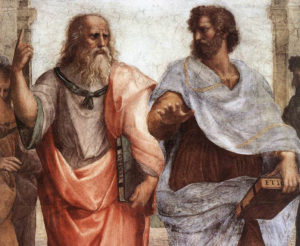
Plato, the idealist (left) and Aristotle, the realist (right).
The ancient Greeks had their myths and temple rituals for the masses, and they had philosophical and mystical schools for the intellectuals of their time. Out of such schools all the great thinkers with their ideas emerged and Greek culture didn’t remain local. It was pushed out into the wide world by Alexander the Great, who hellenised the countries (made them Greek) he conquered, spreading the Greek ideas around the Mediterranean Sea, Egypt, Middle East and towards the border with India. The ancient world has become Greek, indeed.
Hall of Fame: Ancient Greece
ROMAN EMPIRE
Another empire entered the world stage which incorporated Greek culture into its own, creating a synthesis of ideas, rituals and values. The people of the Roman empire were very pious people, tolerant towards the various rites and religions of their vast territory. From their notions we derived ideas about how politics should be made, clearly a Greek invention, but redefined and developed further by the Romans. In Latin, the language of Rome, we based lots of our vocabularies and terms to describe scientific, philosophical and political concepts. Latin became the etymological root of many words that are used nowadays in European languages. The Roman genius wasn’t necessarily about invention, although they did some of that too, but rather in adaptation of existing ideas, which originated mainly from Greek thought. One could claim, the Greeks initiated culture, and the Romans perfected it for the world. To Rome we owe the complex structure of the state and institutions that govern the various aspects of today’s modern, Western countries.
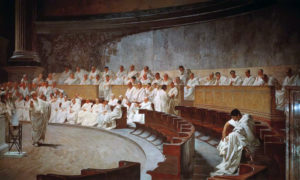
Rome had an influential senate in its history as a republic and empire.
The Roman mindset was about discipline and self-control. The emperor Marcus Aurelius at the height of Roman power was a Stoic philosopher and therefore a proponent of a virtuous life and peaceful mind. In a later period Neoplatonists revived the ideas of Plato. At this point you can see how ideas and world views kept returning and evolving based on preceding philosophies and generations of thinkers. The revived Greek ideals in the form of Neo-Platonism merged with and influenced a new kind of ideology which was taking hold in the world towards the end of the Roman empire - Christianity was on the rise.
In late antiquity the Roman empire was in decline and arrived at the crossroads. For many reasons people stopped believing in their institutions and the traditional ways of doing things. The ideological vacuum was filled by the growing number of Christian sects. The history of Christianity is characterised by conflicts, bloodshed, controversies, destruction and murder. Once a victim of persecution Christianity became the persecutor itself as soon as it became the official state religion of the declining Roman state. The empire split in two and the western part was eventually conquered by the barbarian European tribes from beyond its northern borders. Those hoards of robbing warriors are the ancestors of modern Westerners. In contrast to Roman culture those tribes were utterly primitive and lacked any capacities to keep up with the dying culture of Rome. They basically took over the remaining structures and cultural concepts from the once glorious Roman empire. Antiquity became the Middle Ages.
Hall of Fame: Ancient Rome
CHRISTIANITY & MIDDLE AGES
The mode of thinking in mediaeval Europe was based on faith in the dogmas of the Bible as the ultimate scripture of God’s revelation. Sciences, arts and knowledge declined rapidly and we ushered in the dark ages. The whole period between the fall of the western part of the Roman Empire (ca. 500 AD), and the beginning of Romanesque art and architecture in Europe (ca. 1000 AD) is 500 years of utter primitivism not even worth mentioning in cultural respect. There aren’t even that many documents or writings found from that period.
Only during the Romanesque and Gothic period of the central Middle Ages from ca. 1000 AD onwards we slowly find thinkers picking up the ideas of Neoplatonism and Aristotle from Antiquity, supplementing Christianity with new perspectives. The slow rise of the West began. With the growth of logical thinking mediaeval universities were founded in which you had to justify the biblical creeds through logical arguments. This intellectual period of incipient cultural growth of the West is called scholastics. Scholastical thinking tried to reconcile the Bible with the Aristotelian views. It was an elaborated, yet dogmatic method, but definitely an improvement on preceding barbarian times that came after the fall of Rome. The most renowned scholastic thinkers were Anselm of Canterbury and Thomas Aquinas.

Gothic style emerged in the central Middle Ages and became typical of that period.
In the middle of the mediaeval period monarchs and nobility often kept fighting against each other. However, intellectual and economic life was slowly growing. The world view of this long period was the Christian creed of personal salvation through God who became human to suffer for humanity’s sins. This salvation narrative put individuality and self-sacrifice into the focus of Western culture. A good Christian could achieve salvation by actively influencing the world with his or her own good deeds and labour for the sake of others, thus the aspect of self-sacrifice.
Christianity had an opportunity to ennoble the world of its time. Instead, it utterly failed in this mission through the use of brutal methods in suppressing opinions which didn’t agree with the official doctrine of the Church. Torture, murder, violence and greed were utilized in protecting the self-interests of the Church and its clergy in the name of God. This state of affairs was soon seriously challenged as the minds of the West continued awakening.
Through a chain of many events, the Greco-Roman ideas were re-discovered by scholars and intellectuals of the late Middle Ages. The last remains of the eastern part of the Roman empire fell to Moslems at the end of the Middle Ages. Consequently, local scholars fled from the east to Europe, bringing with them new books and manuscripts preserved from antiquity. The discovery of America opened new opportunities and lands for European exploration. All these developments gave birth to a new worldview: Renaissance humanism.
Hall of Fame: Medieval period
RENAISSANCE HUMANISM
Renaissance, from the French word rebirth, was the rediscovery of Greek and Roman culture in the Christian world. It was the beginning of a steep rise of the West. A new view of the world took place in the collective consciousness, a philosophy that put the human individual into the centre of philosophical thinking: humanism. The scholars, artists and intellectuals of Renaissance were interested in broad topics and became an ideal of well educated people with a broad knowledge in all areas of human affairs.
Nicolaus Copernicus and Giordano Bruno had access to various manuscripts from antiquity which helped them make their important contributions. Copernicus put the sun into the centre of the solar system and Bruno proclaimed the multitude of worlds among the stars. The former managed to escape the claws of the Church. The latter wasn’t that lucky and had to pay for his progressive thoughts with his life at the stake. Artists such as Leonardo da Vinci and Michelangelo raised the arts and culture to new heights and became the embodiments of the archetypal Renaissance men. The individuality of the artist was reinforced. Greek sculpture was heavily imitated.
The Church greatly benefited from this artistic flow of creative energies. It financed splendid projects in arts and architecture, such as the rebuilding of St. Peter’s Basilica in Rome. However, the corruption inside the Church led to an ideological revolt which split European Christianity, giving rise to Protestantism. It plunged the European continent into unnecessary religious wars for over a century.
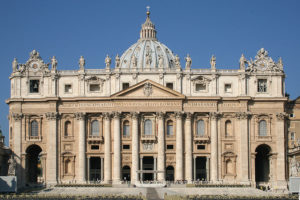
St. Peter's Basilica is typical of Renaissance, incorporating Greco-Roman features.
A revolution in science took place at the same time. Francis Bacon established empiricism, a view that experimentation and observation of physical phenomena should be the method of research. He is the father of modern science. Galileo and Newton made their own groundbreaking contributions to society and raised science to new levels of knowledge, becoming the progenitors and key figureheads of early modern Science.
The discovery of America initiated the era of colonialism in which European monarchs would compete over the resources of the New World. The wealth streaming from America and other newly explored lands made the European countries ever richer, raising over centuries the standard of living and causing the development of a new social class: city dwellers from the Middle Ages became the wealthy bourgeoisie of the early modern era.
In the meantime, after many years of wars and bloodshed, the Church finally lost its political power monopoly. The pouring wealth from the colonies, technological advances, scientific progress, artistic highlife and the end of religious wars in the middle of the 17th century gave rise to the era of Enlightenment, a period which would eventually carry the West into the modern times.
Hall of Fame: Renaissance
THE AGE OF ENLIGHTENMENT
I mentioned at the beginning of this elaboration that the West is characterised by its focus on rationality. The age of enlightenment is the period of roughly 150 years which established this exact concept of rationality.
Through the revival of the Greco-Roman culture thinkers turned away from the dogma of the Church towards rational, logical thinking. The development of the intellect, of reason, became the focus of philosophy and science. Religion wasn’t enough to satisfy the awakening mind about life and society. Faith became synonymous with superstition and intolerance. The agrarian economic system that secured the power of nobility and the Church till then entered its decadent phase, when the rulers considered their power as absolute and above any law. However, the new growing social class of the bourgeoisie and intellectuals were creating new systems of thought in all areas of life that opposed the traditional concept of the established, mediaeval order of kings and queens.
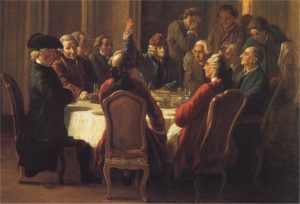
Enlightenment philosophers discussing new ideas at diner.
It is the time of Voltaire and Rousseau who like no one else embodied the spirit of the Enlightenment, during which thinkers tried to provide a new explanation for society based on the new changing circumstances and how it could function outside the existing power structures of the Church and nobility. The humanism of the Renaissance transformed into the concept of universal human rights which valued the freedom and individuality of every person, a key notion that would soon become the foundation stone of the modern Western nations. New ideas were explored in the domains of politics, philosophy, science and technology. The idea of the republic as the ideal state became entrenched in the minds of people based on the revival of Greek thought in the Renaissance and some examples of successful republics in the Middle Ages.
Adam Smith described the new economy that was taking hold in this era thanks to the accumulation of wealth from the colonies and the emergence of manufactories, the precursors of factories and companies, where machines started to be utilised for the first time. The notion of capitalism was born.
In the colonies a new nation of America was born that was founded on the ideals of the Enlightenment that were circulating all over the Western world, a new republic that freed itself from the tyranny of religious authority and intolerance. The American Revolutionary War for independence was the first major revolution that would usher in a new world order based on the ideas of the Enlightenment.
The second revolution took place in Europe, starting in France as the French Revolution which soon engulfed all of Europe, spreading across the countries the ideals of the Enlightenment, with Napoleon Bonaparte putting some of those political ideas in practice during his intense, but short-lived reign over the continent.
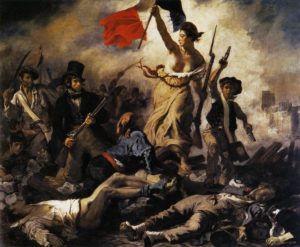
Ideas of Liberty guided the people during the Revolution.
Although the French Revolution failed and Napoleon was defeated, the world has never been the same ever since. The ideas that emerged during the Enlightenment continued to live on in the heads of common people, in whom new nationalistic consciousness would soon awake. In the meantime, a new, gradual, slow and silent revolution was taking place in society, a change that would transform the Western countries beyond recognition.
INDUSTRIAL REVOLUTION
After the two revolutions in America and Europe ended, the development of science that started during the Renaissance culminated in the emergence of many inventions which provided the world with new technologies that completely changed the way of production. Instead of agriculture and private labour, goods were now produced en masse in big factories with the help of new machines that relieved human workers from additional manual labour. People fled from the countryside to cluster in big cities in order to make a living in the growing number of factories. The human population exploded over the course of decades. In combination with the wealth from the colonies the world transformed completely in its materialistic and technological foundations.
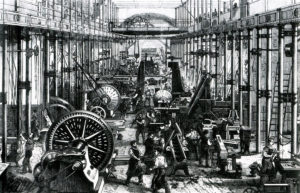
Machines are introduced as means of production in 19th century.
During that time of technological progress the emerging ideas of citizenry and nationality waged a war against the remaining forces of nobility. It was a constant back and forth between sides in various revolts and uproars. The ideas of the Enlightenment were slowly maturing, empowering the new social classes of workers, intellectuals and employees to fight for intellectual freedom and rights.
In this conflict against the nobility of the agrarian period and based on the rational ideas of the Enlightenment the concept of nation-states arose in the minds of common people. The religious notion of the divine right of kings and queens was no more valid. People wanted to be governed rationally in the new framework of freedom and individual human rights, exactly those Western values that had their deep roots in the Greco-Roman culture and its revival during the Renaissance and the Enlightenment era. As a result, the modern nation-states soon emerged as a result of many revolts and wars for cultural self-determination.
With the growing complexities of mass production in factories and due to basic human greed and lack of compassion a need arose for the securing of better labour conditions of the working class in the factories. Many ideas and systems of thought were created that tried to describe the current economic problems and present solutions to the abuses of labour. As a result, various socialist movements arose that tried to solve the problem of the new economy of rising capitalism and mass production.
In the course of decades the more moderate and reasonable views gave rise to social democratic parties around the world which eventually found their way into the rational and enlightened concept of modern liberal democracy. The more radical and extremist views on the other hand manifested themselves as communist, authoritarian regimes which eventually took over a huge portion of the world, enslaving and murdering nearly whole nations with their social experiments, threatening the world with the terrifying prospect of a global, violent, communist revolution.
Beside the radical communists, another enemy of the values of the Enlightenment would soon oppose the West and the world at large, with its deranged mania for racial superiority based on colonialism gone wrong and unmatched industrial brutality which would eventually result in self-aggrandising facist regimes in some industrialised and militarised countries that would threaten the world with terror, destruction and enslavement.
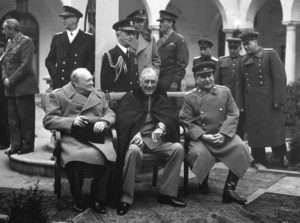
Free world leaders and socialist dictator meeting to discuss post world war order in 1945.
The rest is the modern history known to all of us, with its two world wars, the Cold War between the liberal west and the communist east, the subsequent collapse of communism, the victory of capitalism and liberalism, the new globalised economic world order with rapid advances in telecommunications technology and social media, and the hollow decadence of corporate greed and forgetfulness we presently find ourselves in.
I hope you can now clearly recognise what the Western values truly are and that they are real. It was a long journey and a complex evolution, indeed. At all times it was the ideals of individuality, rationality and freedom which had to fight their way towards realisation and fulfilment. The Greco-Roman spirit of Renaissance and Enlightenment, in combination with the Christian notion of self-sacrifice for the needy, has always been threatened from within and without, from within in form of self-created dogmas and delusional doctrines, and from without in form of authoritarian monarchs, communists and fascists. Do you see any parallels in the world today?
CONCLUSIONS
Let me reference the key points I mentioned at the beginning of this essay, so that you don’t miss a beat from this historical sketch of the West. There is a solution to the problem of disorientation in the Western world and it lies in the historical knowledge and intellectual accuracy. The answers are all out there. If we feel that our lifestyle is pointless, that’s only because we forgot our innermost values.
I described to you in broad strokes what made the West the most influential culture in the world. Of course I focused only on the essential aspects. You can always dive into the complex details of history and the world of ideas at your leisure. In a generic overview many aspects remain unmentioned. For our purpose of reorientation it’s not the details that matter most, but the essence of great ideas.
It must be stated that the history of the world is a record of incredible greatness of the human spirit and of unspeakable suffering and egoism of human hatred. If you want to find negative aspects in the Western culture, you will always be able to find plenty. You have to realise it’s not just a matter of facts, but also a matter of personal preference on how you want to filter out facts to make subjective evaluations. You could consider capitalism as a tool of abuse, corporate greed and corruption, or as an effective method of producing the greatest material wealth the world has ever seen. You could consider colonialism as an era of growing infrastructure that brought civilisation to remote areas and underdeveloped cultures, or as a European system of oppression and greed for power. You could uncompromisingly point out that America was based solely on slavery, or recognise that America is work in progress, hasn't acted perfectly in the past, but can evolve and improve for the better over time as people's collective mind and consciousness evolves and improves over time.
There will always be some grain of truth in all the seemingly contradictory views, and you need to be smart enough to recognise the greatest ideas while also condemning the horrendous crimes against humanity. You need to develop the right sense of judgement and not simplify issues only because it becomes convenient for you to see things only through a particular lens. Ideology sees things only in one way. Knowledge considers all the ways of seeing things. That’s what facts are at the end: objective phenomena in time and space that can be observed from various points of view.

Let's focus on what unites us, not what divides us. We're all in this together!
Know the facts, and make evaluations that are fair and balanced. That’s what rationality means. That’s what the intellect does. That’s the value that the Western culture brought to the world: the power of the mind to use your reasoning faculties. The development of the mind leads to the appreciation of individuality of every thinking person. The acceptance of individuality goes hand in hand with the assignment of personal freedom and thus individual responsibility. That’s the Western ideal in its core that should be admired with nearly sacred fervor by everyone in the West.
That’s why your life matters. That’s why your decisions matter. Every epoch that tried to revive the ancient ideals of freedom and rationality proclaimed the same great truths. That’s the gift of the Western culture to the world: the freedom to develop personally by using your mind and intellect, to grow as a free and unique individual with personal responsibility for your decisions. Even the distorted doctrines of Christianity with the Church's unlimited bigotry promulgated individuality with a strong emphasis on compassion and selfless action in daily life to achieve salvation. The age of Enlightenment was an era that ultimately channelled the ancient ideals into the modern world, giving rise to industrial production and science.
Every new idea that brings change unfolds certain social dynamics. As time passes by, moderate and radical views emerge side by side as they fight for the idea with their own means. Radicalism and extremism of any kind, even when the idea itself is noble, is always wrong. To push an idea into the extreme is to remove it from its original meaning. To be moderate means to use your mind, the intellect, and to make legit judgments based on facts and the values of humanism that derive from the Greco-Roman culture, the Renaissance and the Enlightenment.
Now you are best prepared to continue your own journey. Now you know what the Western values are. I’m curious whether you’re surprised by my explanation, or whether you presumed this all along at the back of your mind. In any case, I hope you could gain some meaning and trust in the Western culture, its rich history and background, realising that not all was doom and gloom after all. Your decisions matter. And good decisions start with a clear perception. Focus on the good stuff, and relegate the bad stuff into the archives of history. Let’s disregard the negativity that binds us and take from the past only that which is valuable to achieve new heights of cultural excellency and harmonious, human relations.
Thank you for reading.



